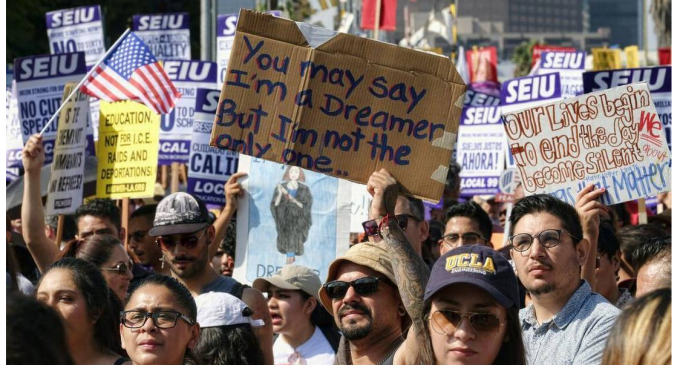DACA program for Dreamers was inspired in part by John Lennon deportation fight | Miami Herald

In 1972, you may have said John Lennon was a Dreamer. He wanted to remain in the U.S. after he overstayed his visa, despite a deportation order from the U.S. government.“I like to be here because this is where the music came from,” Lennon said, explaining his desire to remain in the U.S., according to NPR. “This is what influenced my whole life and got me where I am today.”Lennon was able to get a short extension of his visa, but his application for a green card was denied.His attorney at the time, Leon Wildes, knew that it would be difficult to keep the former Beatles star in the country because he had been convicted of marijuana possession, according to Vice News. That meant Wildes had to get creative—and his creativity ultimately shined a light on a once-secret federal policy that, decades later, President Obama would use to protect 800,000 young, undocumented immigrants from deportation, according to NPR.President Donald Trump has signaled that he may end that Obama-era program that has allowed some undocumented immigrants brought to the U.S. as children, or “Dreamers,” to remain in the country.But the policy, which Obama announced in 2012, might not have been possible in the first place had it not been for Wildes’ work representing Lennon back in the 1970s.“There were rumors of certain guys who … had critical criminal backgrounds and bad immigration histories and seemed to be still around,” Wildes told NPR. “I always had a feeling that the government must have a program to exercise some discretion.”DACA is back on the chopping block again If you’re an immigrant who was unlawfully brought to America as a child, you might be one of the more than 600,000 young adults registered under DACA, or the Deferred Action for Childhood Arrivals. President Trump has flip-flopped on whether he will undo the executive action that then-President Obama used to create the program, but now Texas has threatened to sue if Trump doesn’t undo the action. What’s the future look like for DACA? McClatchy White House correspondent Franco Ordoñez explains. Natalie Fertig McClatchyFederal law, Wildes knew, allowed immigration officials to exercise discretion in their jobs—prioritizing some deportations over others that were deemed less important.But Wildes couldn’t prove such a program actually existed until he filed a Freedom of Information Act (FOIA) request, and a box of documents arrived at his office proving him right.“When the box came into my office, there was jubilation!” Wildes told NPR. “Unbelievable feeling that I had succeeded.”While Lennon eventually secured a green card, Wildes—through his FOIA request—was the first to reveal the fact that U.S. immigration officials had a program to defer action on deportations, according to NPR.“Before the work of Mr. Wildes, deferred action was a complete mystery because there wasn’t even a guideline for attorneys and noncitizens,” Shoba Sivaprasad Wadhia, an immigration law professor at Penn State University, told NPR.In other words, the files Wildes made public demonstrated that U.S. immigration officials had a program in place for leaving immigrants be—even if they were in the U.S. illegally—so long as they had been deemed a “non-priority” for deportation, according to Vice.Obama built upon that policy in 2012 when he rolled out his Deferred Action for Childhood Arrivals program, according to NPR: “Eligible individuals who do not present a risk to national security or public safety will be able to request temporary relief from deportation proceedings and apply for work authorization,” Obama said as he announced it.But Obama’s policy may not have been possible had Wildes not made it clear that immigration officials had been using “deferred action” for decades.“The DACA program is really a tribute to John Lennon,” Wildes told VICE News.Graham discusses his friend John McCain’s passion for immigration While announcing new bipartisan immigration legislation, Sen. Lindsey Graham discussed his friend Sen. John McCain’s passion for “Dreamers” and how he passed his desire to pass immigration reform on to the South Carolina senator.
Source: DACA program for Dreamers was inspired in part by John Lennon deportation fight | Miami Herald




There are no comments at the moment, do you want to add one?
Write a comment